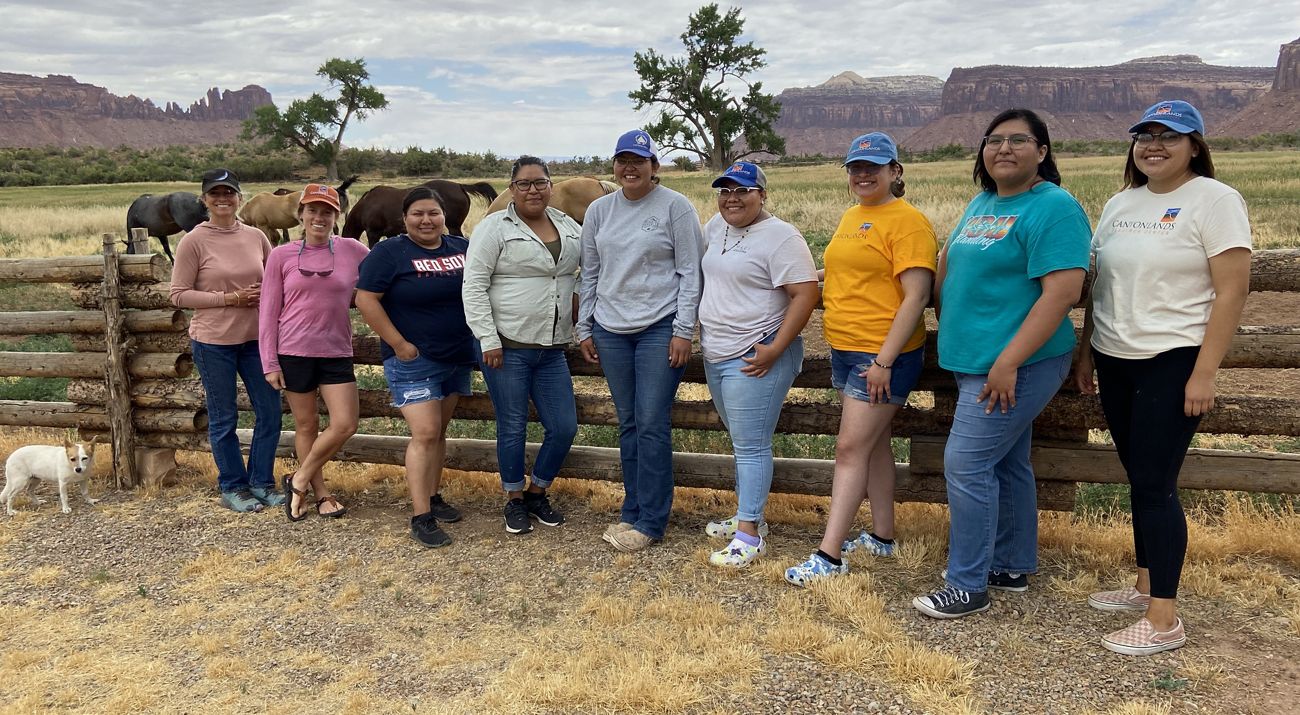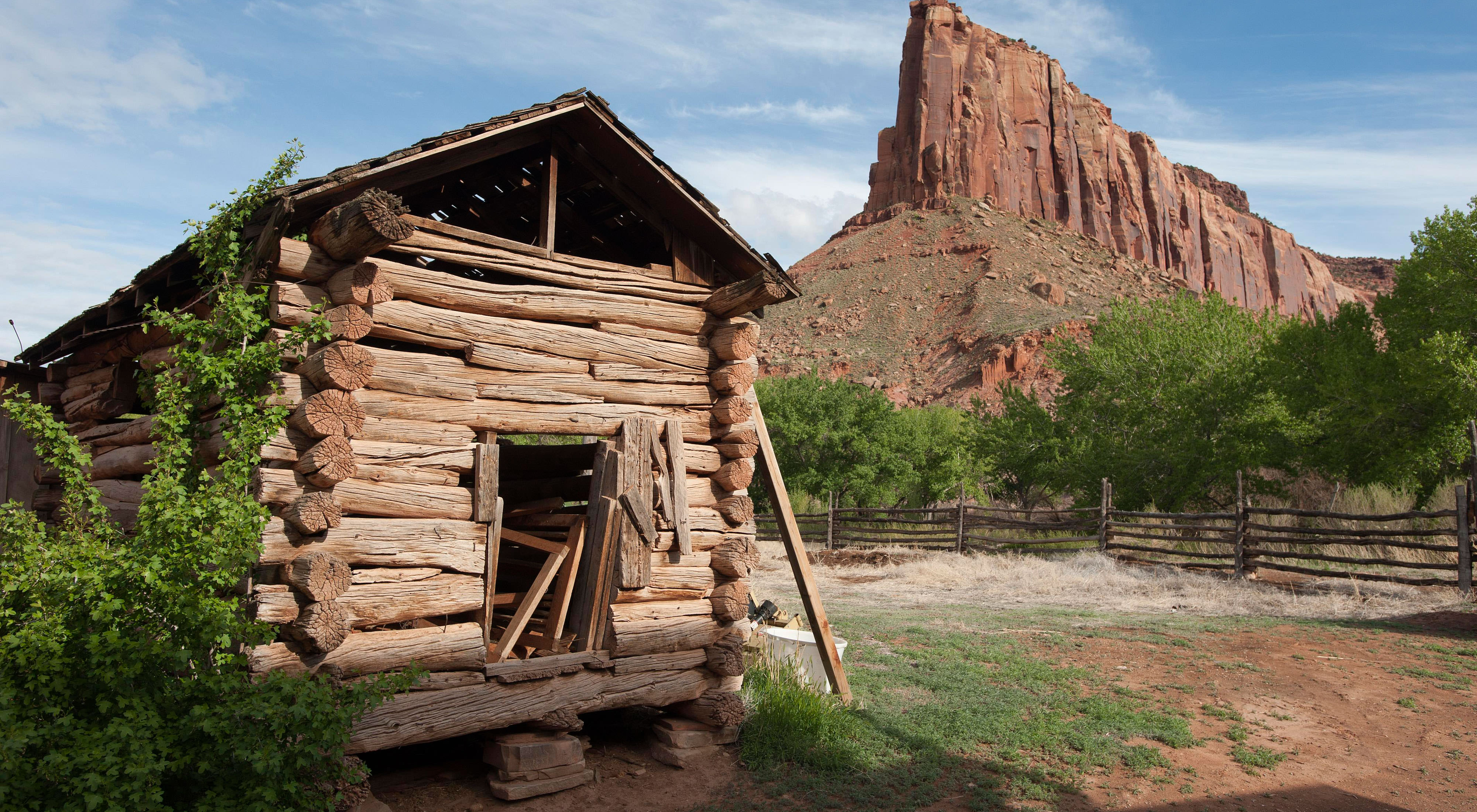Native American Future Conservation Leaders Gain Skills and Connections in Innovative Learning Program
A first-of-its-kind learning exchange in Utah connects tribal youth to scientists, ranchers and Indigenous scholars.
For the second year in a row, students traded their summer break to attend Utah’s NATURE Program—Native American Tribes Upholding Restoration and Education—at Utah’s Canyonlands Research Center and Dugout Ranch. Based on their goals, students co-developed the curriculum with TNC and the Utah State University, Blanding. Between meeting with scientists, ranchers, land managers and indigenous scholars and sharing their own cultural traditions, the program was full of promise.
For millennia, Indigenous Peoples have relied on and stewarded the land for their sustenance, medicines, traditions and cultural practices. They suffered a heart-wrenching disconnection from the land when Europeans and disease wiped out many of their ancestors. Learning from our own mistakes in the past, The Nature Conservancy is dedicated to elevating Indigenous Partners’ Voices and Choices as the original stewards of this land.
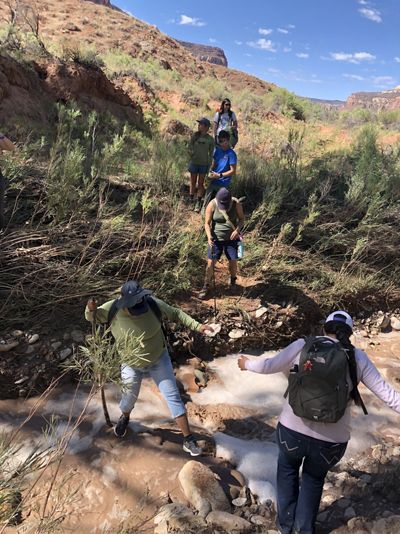
Stay in the Loop
Get conservation stories, news and local opportunities from where you live.
Sign Up TodayLand is Life
Amber Renee Archie, a Navajo and Northern Arizona University student from Pinon, AZ, spoke about the importance of nature in her life.
“For me, land means life. A life sustained by what the Diné (Navajo) and I know as Mother Earth. In this depiction, Mother Earth is the giver of all life, which we must cherish and take care of throughout our lives for my generation and the next. Through this meaning and way of life, I intend to do all I can in this lifetime to sustain and do my best to take care of our Mother Earth and all that she provides.”
The experiences ranged from learning about watershed restoration to examining biological soil crusts under microscopes and speaking with Indigenous scientists about traditional ecological knowledge.
“The program involved a lot of outdoor learning, which can benefit my daily life, especially when living on a reservation. It has taught me a lot about finding different ways to take care of the land,” said Verna Thompson, a Hopi Tribe member from Second Mesa, AZ.
About the CRC and Dugout Ranch
Dugout Ranch is an icon of the American West located in the heart of the Colorado Plateau and is the largest private inholding in the Bears Ears National Monument. It is a landscape of vast red rock buttes and canyons cut with rare, cottonwood lined streams. The Nature Conservancy purchased the ranch to prevent development. It has become so much more than that.
Today, the 5,207-acre ranch and allotments, spanning more than 340,000 acres of private and public lands, is the foundation for the ground-breaking Canyonlands Research Center. The Center works to increase our understanding of the interactive effects of climate change and land-use and arm decision-makers with new information to adapt to challenges such as climate change, land use changes, recreation impacts, and invasive species.
Climate is a Priority
Nichole Butler, Navajo, from Chilchinbito, AZ, is studying Public Health at Utah State University, Blanding. She considers climate change one of the biggest threats we face.
“Each year, there are record-breaking temperatures, and the biggest challenge would be how we help plants and ecosystems adapt to that type of environment.”
You can bet Nichole and the others were inspired when they learned about cool climate research projects underway at the CRC.
The students met with scientists studying a heritage breed of cattle that may be better adapted to desert environments because they can travel further for forage and feed on a wider range of plant species than typical European breeds like Angus. The students also got a close-up look at biocrusts—the mosses, lichens, cyanobacteria and fungi that serve as the desert’s skin. TNC and the US Geological Survey are researching an innovative way to restore biocrust, which protects soil health, increases fertility and captures carbon.
“As young leaders forging careers in environment and sustainability, they walk in two worlds of western science but also bring so much of their experience and knowledge of indigenous culture and practices,” says Nichole Barger, TNC in Utah’s interim science director. “They had the opportunity to learn about land management from a western science perspective while exploring ways in which they were able to connect to the land within their own native traditions. Finding a way to combine Indigenous knowledge and Western science is imperative to creating a sustainable future in the face of a warming climate.”
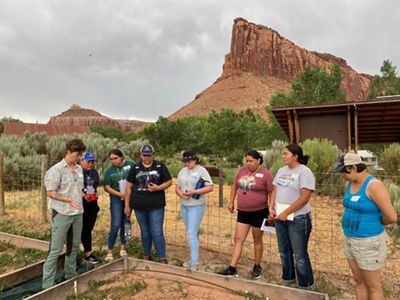
More than Conservation
While NATURE interns forged fast friendships, some experienced a little apprehension—including Kirsten Begay, Navajo Tribe—before the program began.
“At first, I was nervous about joining the NATURE program, but I thought about how it would be a great opportunity to learn about different topics pertaining to my everyday life as a young Native American woman who is interested in agricultural sciences. I am glad I took this opportunity to learn more about my ever-changing environment.”
In addition to connecting with the land, building new relationships, and engaging in restoration projects, the students also learned important job skills. Corey Tartsah, who represents the Kiowa, Caddo and Navajo Tribes, will always remember the support mentors provided when she applied for vet school during the NATURE Program.
“Overall, this program has taught me many things, including the importance of applying for this internship for future job opportunities.”
For Shay Curleyhair, Navajo, from Chilchinbito, AZ who studies Animal Sciences at USU Blanding, the 7-week experience provided a clearer vision for her future.
“This internship has honestly helped me get back on track within my major. For the past two semesters in school, my mental state hasn’t been the best and I’ve been having doubts for my major. I wasn’t in any classes that pertained to my major and it really put me down. But taking this internship and doing hands-on research has brought back my love for animal science and broadened my knowledge.”
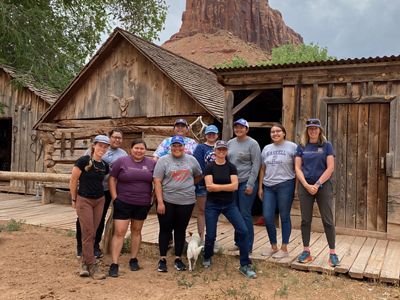
Expanding the Opportunity
With additional funding support, the NATURE Program would expand from six to 12 students and incorporate an opportunity where students could implement a project on Indigenous lands to support their communities. If enough money can be raised, our future conservation leaders would bond and learn about rivers and riparian habitat while on a San Juan River trip led by a Native guide. If you would like to support this effort, donate here.
TNC and USU-Blanding launched this program in 2021 to foster new environmental leaders and amplify diverse voices and perspectives in the fight to combat climate change and sustain agricultural lands on the Colorado Plateau. For the mentors, scientists and tribal students, this program sparked growth and innovative thinking. Learning was on a two-way path.
To learn more, contact Kristen Redd.
Inspiration for Earth in Your Inbox
Sign up for our monthly Nature News updates for stories, tips for action and event opportunities.
